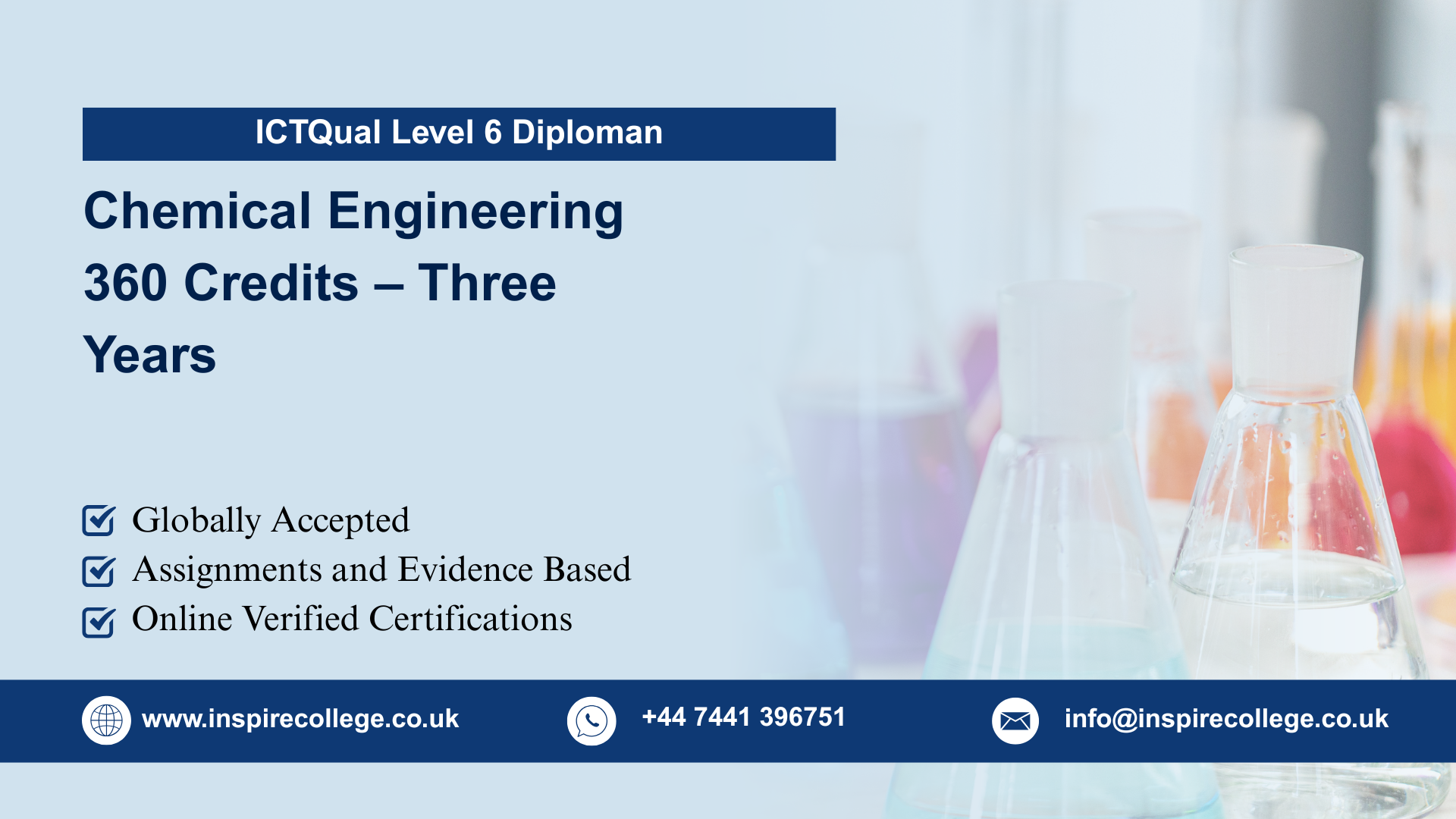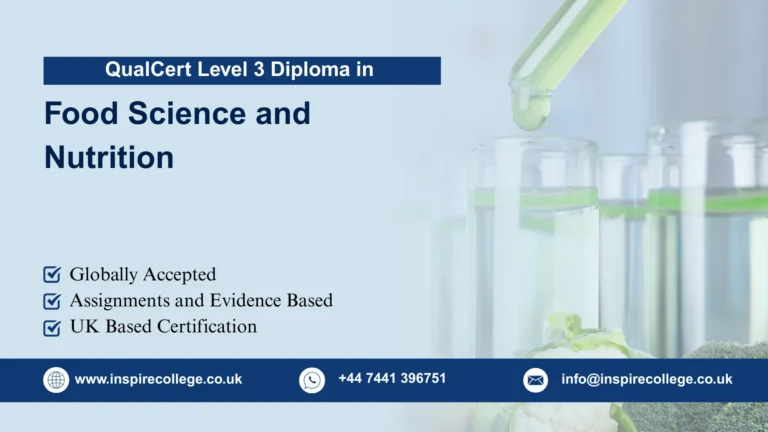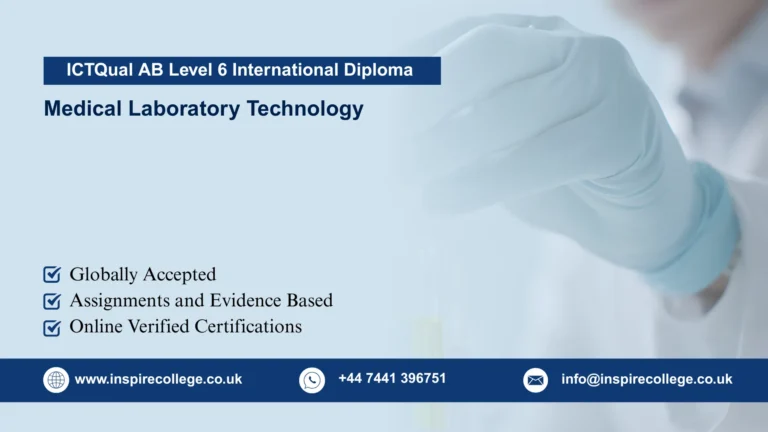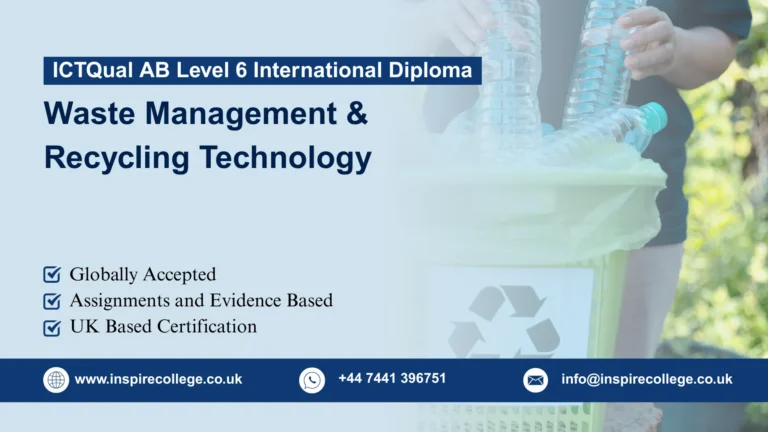
ICTQual Level 6 Diploma in Chemical Engineering 360 Credits – Three Years
The ICTQual Level 6 Diploma in Chemical Engineering is a comprehensive program designed to equip learners with advanced knowledge, practical skills, and professional competencies in the dynamic field of chemical engineering. With industries increasingly reliant on chemical processes for energy, pharmaceuticals, materials, and environmental solutions, expertise in chemical engineering has become critical for technological innovation and industrial growth. This diploma is ideal for both freshers and professionals seeking to advance their careers in research, production, and process management.
Spanning three years and carrying 360 credits, the program provides a structured pathway to mastering core and advanced concepts in chemical engineering. Learners gain a strong foundation in chemistry, thermodynamics, fluid mechanics, process design, chemical reactions, and instrumentation. Advanced modules cover process optimization, environmental sustainability, industrial safety, and chemical plant design, ensuring graduates are capable of handling real-world industrial challenges.
The curriculum emphasizes both theoretical knowledge and practical application. Students engage in laboratory experiments, simulation exercises, process modeling, and industry-oriented projects. These experiences enable learners to design, analyze, and optimize chemical processes safely and efficiently. The program also incorporates project management, quality assurance, and professional ethics, equipping graduates to work effectively in multidisciplinary teams and leadership roles.
By completing the ICTQual Level 6 Diploma in Chemical Engineering, learners achieve a globally recognized qualification that opens doors to advanced career opportunities, specialized technical roles, and higher education pathways. Graduates emerge as skilled, innovative, and adaptable chemical engineers, ready to contribute effectively to industrial processes, research initiatives, and sustainable engineering solutions worldwide.
The ICTQual Level 6 Diploma in Chemical Engineering is designed to ensure learners possess the foundational knowledge, skills, and competencies needed to succeed in this advanced program. Meeting the entry requirements prepares learners to engage fully with both theoretical concepts and practical applications in chemical engineering.
Age Requirements
- Applicants must be at least 18 years old at the time of enrolment.
Educational Requirements
- Completion of a Level 5 or equivalent diploma in Chemical Engineering, Process Engineering, or related technical fields.
- Strong background in mathematics, physics, and chemistry is recommended.
- Fresh graduates should have completed secondary education (A-levels, high school diploma, or equivalent) with STEM-related subjects.
Professional Experience
- Professionals with 2–3 years of verifiable experience in chemical engineering, process design, or industrial operations may be eligible for direct enrolment.
- Practical experience in laboratories, production processes, or industrial chemical systems is advantageous but not mandatory for fresh learners.
English Language Proficiency
- Applicants whose first language is not English must demonstrate proficiency through recognized tests such as IELTS (minimum 5.5 overall), TOEFL, or equivalent.
- Competency in technical reading, writing, and communication in English is essential for successful course completion.
By meeting these entry requirements, learners will be well-prepared to engage with the ICTQual Level 6 Diploma in Chemical Engineering, develop advanced technical and practical skills, and pursue rewarding career opportunities in the global chemical and process industries.
Mandatory Units
This qualification, the ICTQual Level 6 Diploma in Chemical Engineering 360 Credits – Three Years, consists of 36 mandatory units.
Year 1: Foundation of Chemical Engineering
- Introduction to Chemical Engineering
- Basic Thermodynamics
- Mathematics for Chemical Engineers
- Fluid Mechanics
- Material and Energy Balances
- Introduction to Process Control
- Chemistry for Chemical Engineers
- Introduction to Reaction Engineering
- Engineering Drawing and CAD
- Professional Skills Development
- Heat and Mass Transfer Fundamentals
- Chemical Engineering Principles
Year 2: Advanced Chemical Engineering Concepts
- Advanced Thermodynamics
- Heat Transfer
- Mass Transfer Operations
- Chemical Process Design
- Industrial Chemistry
- Process Systems Engineering
- Fluid Dynamics and Flow Systems
- Reaction Engineering
- Environmental Engineering
- Process Control and Automation
- Process Modeling and Simulation
- Engineering Materials
Year 3: Specialization and Industry Application
- Advanced Process Control
- Process Safety and Risk Management
- Chemical Plant Design
- Sustainable Chemical Engineering
- Separation Technology
- Computational Fluid Dynamics (CFD)
- Advanced Materials Science
- Process Optimization
- Industrial Placement / Internship
- Capstone Project
- Project Management for Chemical Engineers
- Biochemical Engineering
The ICTQual Level 6 Diploma in Chemical Engineering is designed to develop learners into highly skilled, innovative, and competent chemical engineers. Over three years, students acquire advanced knowledge, practical expertise, and professional competencies, preparing them for diverse roles in process industries, research, and sustainable engineering.
Year 1: Foundation of Chemical Engineering
Introduction to Chemical Engineering
- Understand the scope, principles, and applications of chemical engineering in various industries.
- Identify key process components and engineering systems.
- Apply fundamental engineering concepts to real-world chemical processes.
- Evaluate industrial trends and technological innovations.
Basic Thermodynamics
- Apply thermodynamic principles to chemical processes.
- Analyze energy transformations and equilibrium in chemical systems.
- Solve thermodynamic equations for process calculations.
- Interpret results to support design and optimization.
Mathematics for Chemical Engineers
- Apply calculus, algebra, and differential equations to chemical engineering problems.
- Model chemical systems mathematically for analysis and design.
- Solve complex equations related to process engineering.
- Interpret results to enhance process understanding.
Fluid Mechanics
- Understand fluid properties, flow behavior, and system design principles.
- Analyze laminar and turbulent flow in pipelines and reactors.
- Apply fluid dynamics equations to process equipment design.
- Conduct practical experiments and simulations.
Material and Energy Balances
- Calculate mass and energy balances for chemical processes.
- Analyze input-output relationships in unit operations.
- Apply balance calculations to real process scenarios.
- Use results to inform process design and optimization.
Introduction to Process Control
- Understand basic control system concepts and components.
- Apply control principles to simple chemical processes.
- Analyze system response and stability.
- Implement practical control strategies in laboratory settings.
Chemistry for Chemical Engineers
- Apply chemical principles to industrial processes.
- Analyze reactions, kinetics, and chemical properties.
- Solve chemistry-based problems for process applications.
- Evaluate chemical behavior in process design.
Introduction to Reaction Engineering
- Understand reaction kinetics and reactor types.
- Analyze rate equations and conversion calculations.
- Apply reactor design principles to industrial processes.
- Conduct basic experimental investigations.
Engineering Drawing and CAD
- Produce engineering drawings and schematics for chemical systems.
- Utilize CAD software for process visualization and design.
- Interpret technical diagrams accurately.
- Apply graphical communication in project documentation.
Professional Skills Development
- Develop teamwork, communication, and problem-solving skills.
- Apply ethical and professional standards in engineering contexts.
- Engage in self-directed learning and professional growth.
- Evaluate case studies to enhance practical understanding.
Heat and Mass Transfer Fundamentals
- Understand the principles of heat and mass transfer in unit operations.
- Analyze conduction, convection, and diffusion processes.
- Apply calculations to design equipment like heat exchangers and absorbers.
- Conduct laboratory experiments to validate theoretical concepts.
Chemical Engineering Principles
- Integrate foundational knowledge across chemical engineering disciplines.
- Apply engineering principles to solve process problems.
- Evaluate system performance and efficiency.
- Develop problem-solving strategies for industrial applications.
Year 2: Advanced Chemical Engineering Concepts
Advanced Thermodynamics
- Apply advanced thermodynamic models to complex chemical systems.
- Analyze phase equilibria, chemical equilibria, and process energetics.
- Use thermodynamics to optimize industrial processes.
- Evaluate results for safety and efficiency improvements.
Heat Transfer
- Analyze conduction, convection, and radiation in chemical processes.
- Design heat exchange equipment using theoretical and computational methods.
- Conduct simulations and experiments for process validation.
- Evaluate heat transfer efficiency in industrial operations.
Mass Transfer Operations
- Understand absorption, distillation, extraction, and crystallization.
- Design and analyze separation processes.
- Apply mass transfer coefficients to real systems.
- Conduct practical exercises to validate theoretical models.
Chemical Process Design
- Develop process flow diagrams and equipment layouts.
- Apply design principles to industrial chemical plants.
- Conduct feasibility analysis for process selection.
- Evaluate environmental and economic considerations.
Industrial Chemistry
- Understand chemical production, reaction mechanisms, and materials.
- Analyze industrial chemical processes for efficiency and sustainability.
- Apply laboratory techniques to real-world chemical systems.
- Evaluate process safety and regulatory compliance.
Process Systems Engineering
- Analyze and optimize integrated chemical process systems.
- Apply systems thinking to design, operation, and control.
- Use software tools for process simulation and modeling.
- Evaluate system performance against industrial standards.
Fluid Dynamics and Flow Systems
- Analyze complex flow behavior in chemical systems.
- Apply computational methods for fluid dynamics.
- Design pipelines, pumps, and reactors for optimal performance.
- Conduct experiments to validate fluid flow models.
Reaction Engineering
- Apply kinetic models to complex reaction networks.
- Design reactors for specific process conditions.
- Evaluate conversion, yield, and selectivity.
- Optimize reaction processes for industrial applications.
Environmental Engineering
- Understand environmental impacts of chemical processes.
- Apply techniques for waste treatment, emissions control, and sustainability.
- Evaluate regulatory compliance and environmental standards.
- Implement strategies for sustainable industrial operations.
Process Control and Automation
- Apply advanced control strategies to chemical plants.
- Use sensors, actuators, and PLCs for automation.
- Conduct process monitoring and fault diagnosis.
- Optimize control systems for safety and efficiency.
Process Modeling and Simulation
- Develop mathematical models for chemical processes.
- Use simulation software for process analysis and design.
- Validate models against experimental or industrial data.
- Apply modeling results to optimize industrial operations.
Engineering Materials
- Analyze properties and selection of materials for chemical processes.
- Evaluate corrosion, degradation, and mechanical behavior.
- Apply material selection principles in design and manufacturing.
- Conduct laboratory testing for material performance.
Year 3: Specialization and Industry Application
Advanced Process Control
- Implement complex control strategies in industrial chemical processes.
- Analyze multivariable and nonlinear systems.
- Conduct simulations to optimize process performance.
- Evaluate control strategies for safety and efficiency.
Process Safety and Risk Management
- Understand hazards in chemical plants and risk assessment techniques.
- Apply safety management systems and emergency response plans.
- Conduct hazard identification and process safety evaluations.
- Develop strategies to mitigate industrial risks.
Chemical Plant Design
- Integrate design principles for complete chemical plants.
- Develop PFDs and P&IDs for industrial systems.
- Apply design codes, standards, and safety requirements.
- Evaluate plant performance and sustainability.
Sustainable Chemical Engineering
- Apply sustainable engineering principles in process design.
- Analyze energy efficiency and resource optimization.
- Develop strategies for reducing environmental impact.
- Evaluate green technologies in chemical manufacturing.
Separation Technology
- Design and optimize separation processes like distillation, extraction, and filtration.
- Analyze separation efficiency and scalability.
- Conduct laboratory experiments for validation.
- Apply knowledge to industrial separation challenges.
Computational Fluid Dynamics (CFD)
- Use CFD tools to simulate flow, heat, and mass transfer in chemical processes.
- Analyze results to optimize equipment design.
- Validate CFD models with experimental data.
- Apply CFD insights to industrial problem-solving.
Advanced Materials Science
- Analyze advanced materials for process equipment and products.
- Evaluate mechanical, thermal, and chemical properties.
- Select materials for durability, safety, and performance.
- Conduct lab-based and computational material analyses.
Process Optimization
- Apply mathematical and computational tools to optimize chemical processes.
- Analyze production efficiency, energy usage, and cost-effectiveness.
- Develop strategies for continuous improvement.
- Evaluate optimization results against industrial objectives.
Industrial Placement / Internship
- Gain practical experience in chemical engineering workplaces.
- Apply theoretical knowledge to real-world industrial operations.
- Develop professional, technical, and problem-solving skills.
- Evaluate workplace practices and processes.
Capstone Project
- Plan, execute, and present a comprehensive chemical engineering project.
- Integrate theoretical knowledge and practical skills.
- Conduct research, analysis, and process design.
- Demonstrate project management and professional competencies.
Project Management for Chemical Engineers
- Apply project planning, scheduling, and resource management techniques.
- Analyze risks, budgets, and project constraints.
- Develop leadership and team collaboration skills.
- Evaluate project outcomes and lessons learned.
Biochemical Engineering
- Understand principles of biochemical processes and bioreactor design.
- Analyze biochemical reaction kinetics and process optimization.
- Apply laboratory techniques for bioprocess development.
- Evaluate applications in pharmaceuticals, food, and biotechnology industries.
Upon completing all units, learners will possess advanced chemical engineering knowledge, practical technical expertise, and professional competencies. Graduates are prepared for careers in process design, production, environmental sustainability, chemical research, and leadership roles in the global chemical industry.
The ICTQual Level 6 Diploma in Chemical Engineering is designed for learners who want to advance their technical expertise, practical skills, and professional competencies in the chemical and process engineering industry. This program is suitable for both freshers and experienced professionals seeking global recognition and career advancement.
Fresh Graduates and STEM Students
- Individuals who have completed Level 5 diplomas or relevant STEM-related qualifications.
- Learners aiming to gain in-depth knowledge and foundational skills in chemical engineering.
Early-Career Professionals
- Professionals with 2–3 years of experience in chemical processes, laboratories, or industrial operations.
- Those seeking to enhance technical expertise, process design skills, and career progression opportunities.
Hands-On and Application-Oriented Learners
- Individuals interested in practical experiments, process simulation, and real-world industrial projects.
- Learners who want to apply theoretical knowledge to chemical plant operations, reaction engineering, and process optimization.
Innovation and Technology Enthusiasts
- Learners passionate about emerging technologies, sustainable chemical processes, and industrial automation.
- Those aiming to integrate innovation and modern engineering solutions into chemical systems.
Aspiring Leaders and Industry Specialists
- Candidates seeking project management, leadership roles, or specialized technical positions.
- Learners interested in research, quality control, safety management, and compliance within the chemical sector.
This diploma equips learners with a globally recognized qualification, practical skills, and professional competencies, enabling them to excel in diverse roles across chemical, pharmaceutical, energy, and process industries worldwide.
We are an approved centre of ICTQual AB, and all learners must enrol with us to pursue the ICTQual Level 6 Diploma in Chemical Engineering. This program provides flexible certification routes for both experienced professionals and fresh candidates, ensuring recognition of prior experience and structured learning for new learners.
Route for Experienced Professionals
- Applicants must have a minimum of 6 years of verifiable experience in chemical engineering, process industries, or related technical fields
- Submit a detailed portfolio demonstrating professional achievements and project experience
- Attend an orientation session to understand course structure, assessment methods, and certification requirements
- Complete a tailored set of assignments and practical evaluations that leverage existing expertise
- Participate in industry-based assessments or project evaluations as required
- Upon successful completion, receive the ICTQual Level 6 Diploma in Chemical Engineering
Route for Fresh Candidates
- Fresh learners or those without extensive professional experience must enrol and complete all 36 course assignments
- Attend lectures, laboratory sessions, and practical workshops throughout the three-year program
- Complete projects, case studies, and technical exercises to develop both theoretical and practical competencies
- Undergo continuous assessments, examinations, and practical evaluations during the program
- Submit a capstone project demonstrating comprehensive understanding and application of chemical engineering concepts
- Receive the ICTQual Level 6 Diploma in Chemical Engineering upon successful completion
Both certification routes provide learners with a globally recognized qualification that equips them with advanced technical, practical, and managerial skills. Graduates gain expertise in areas such as process design, reaction engineering, industrial safety, sustainable chemical processes, plant operation, project management, and process optimization, preparing them for specialized roles and leadership positions in the global chemical and process industries.
Register Now
FAQs for ICTQual Level 6 Diploma in Chemical Engineering






